If your partner died, you would hope for sympathetic treatment from the Powers That Be. The reality is very different. Let’s, just for a moment, look at the financial realities. Eligibility for Bereavement Support Payments has just been slashed from 20 years to 18 months. Oh, and you have to be married to receive them.
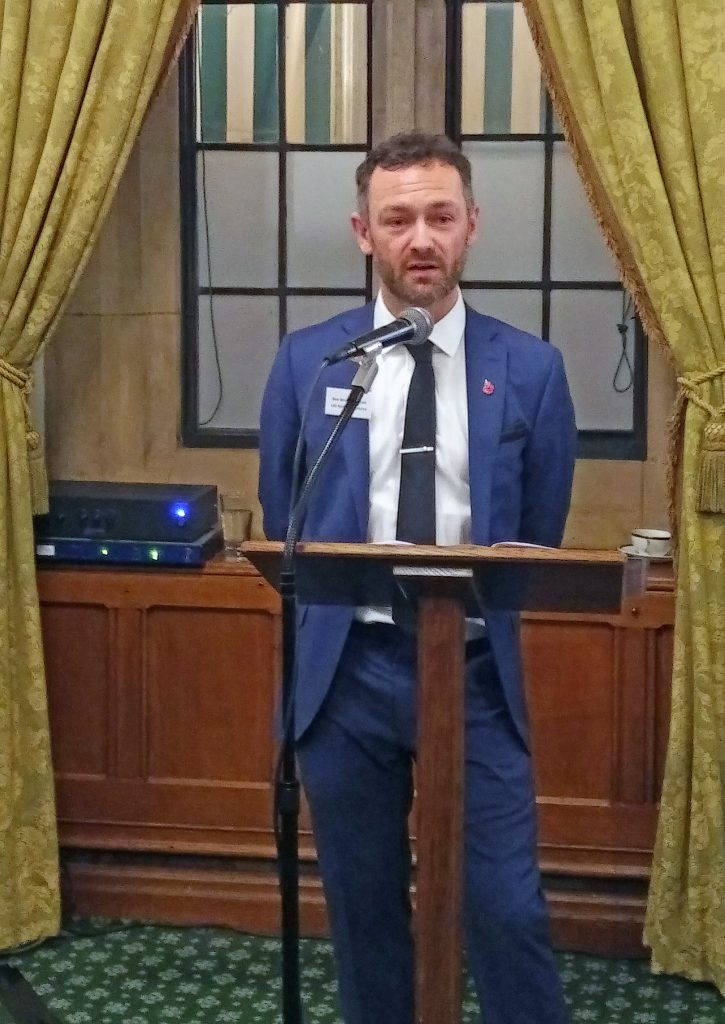
Still wondering what the fuss is about? What if I told you that nobody knows how many children are growing up in a household with a widowed parent? Believe it or not, no such data is collected and so the number of families with children that have experienced a bereavement is simply unknown.
In other words, Government policy in this area is built on foundations of sand. In a perverse twist, however, the Government does collect data about the number of children whose parents are divorced.
Added to this horrible mess, the bereaved family is likely to deal with untrained teaching staff and medical professionals who have no idea how to deal with the remaining parent, let alone their children. In short, if your partner or spouse dies, there’s a very good chance you’ll receive little to no support when you need it most.
Making the Lives of Bereaved Families Matter
These are the realities outlined in a new report called Making the Lives of Breaved Families Matter that’s been published by the Life Matters Task Force. The Task Force a coalition of charities* and other interest groups campaigning to ensure bereaved families get the support they need.
It is chaired by Ben Brooks-Dutton, a name that will probably be very familiar to any bloggers reading this. Ben was widowed five years ago when his wife, Desreen, was knocked down by a motorist who had confused the accelerator for the brake and mounted the pavement at 54mph.
Desreen was so seriously injured she died at the scene leaving Ben to raise their son Jackson. If it hadn’t been for the fact Ben pushed Jackson’s pushchair out of the way, he may also have been a casualty.
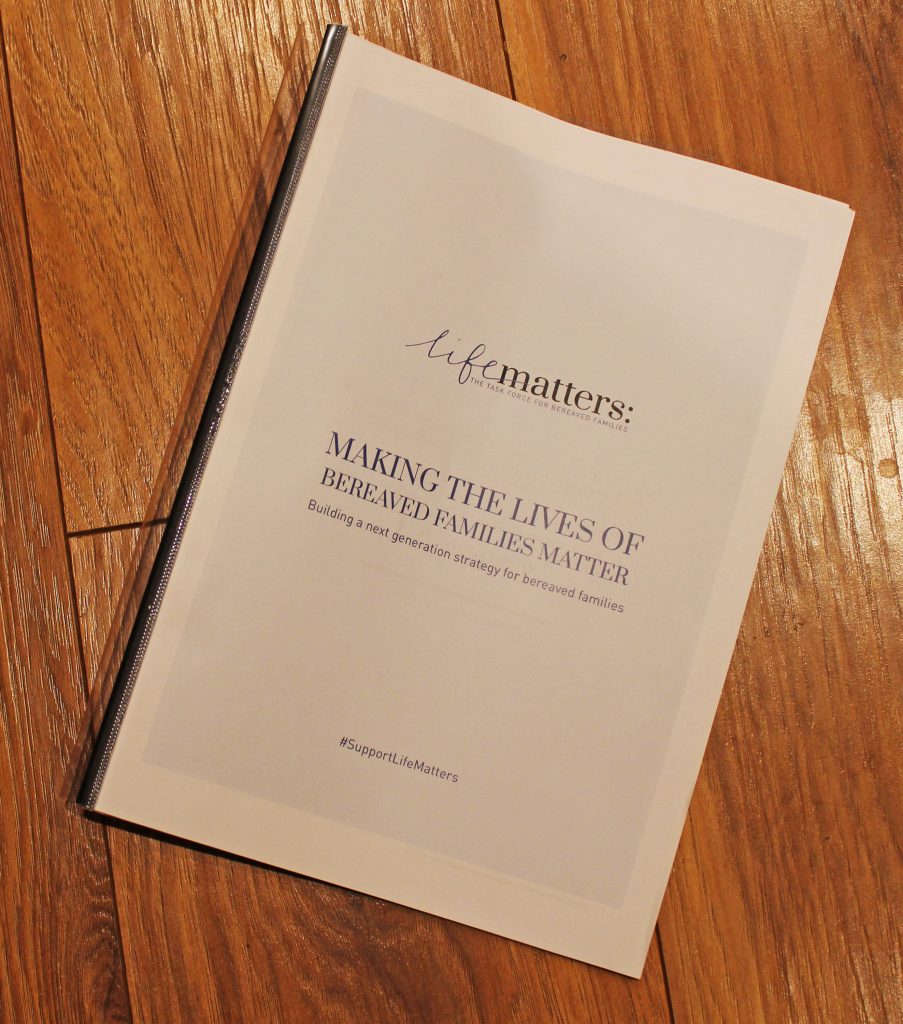
Personal experiences of bereavement
The report was launched earlier this week at the Palace of Westminster at an event hosted by Carolyn Harris MP, who herself was widowed in her thirties. At the launch, Harris, MP for Swansea East, explained that she was working as a barmaid at the time of her bereavement and financially insecure.
The experience spurred her on to go to university as a mature student. This led to work for various community groups and eventually trod a path to the House of Commons where she has campaigned for the rights of bereaved families.
Also speaking at the launch was Brooks-Dutton. He outlined his own experiences in a thoughtful, candid and emotional address.
Following Desreen’s death, Ben took to the word processor. He launched a blog, https://lifeasawidower.com (a great read, but Ben has moved on and these days can be found at https://manalive.life) and wrote a book It’s Not Raining Daddy, It’s Happy. In his own words: “I wrote my way through it.”
Support for Ben and his family had been minimal. Ben said the various “bereavement services found me” and this only happened because of his heightened profile as a blogger and author. If he hadn’t started writing, he may have received no support at all.
Actions for change
The Life Matters Task Force is calling for six actions in its report:
Better information
When registering a death, the number of dependent children reliant on the deceased should be recorded. At present, such information isn’t recorded. This would help provide better services to those who need it and with accurate information being available, Government can create policies that will help support bereaved families.
Bereavement training for educators and carers
Recognising there are poor levels of institutional support for bereaved children, the Task Force wants all teachers and carers of children to receive bereavement training. The idea is to help them recognise and respond to a child’s grief.
Improved bereavement education in schools
The Task Force would like bereavement to form part of the Personal, Social, Health and Economic (PSHE) curriculum in England. This would ensure children receive age-appropriate learning on bereavement and grief.
Better cross-Government working
The Task Force would like a Governemnt Minister take responsibility for bereavement. It would also like to see the introduction of a cross-Governemnt bereavement strategy to ensure policies are aligned across Government departments.
Workplace bereavement guidelines
The Task Force recommends that every organisation should have a bereavement policy for staff.
Improved financial support
The Task Force wants the Government to start a new consultation into how bereaved families should be supported financially by the Government. It wants financial support to be made available for longer and to be available to parents who aren’t married.
Uncomfortable thoughts
While I was at the report’s launch, Brooks-Dutton and Harris’s words resonated with me. While it was rather morbid, I found myself wondering how I’d cope if Mrs Adams passed away. I’d be left on my own dealing with two heartbroken young children and I’d be in huge financial trouble.
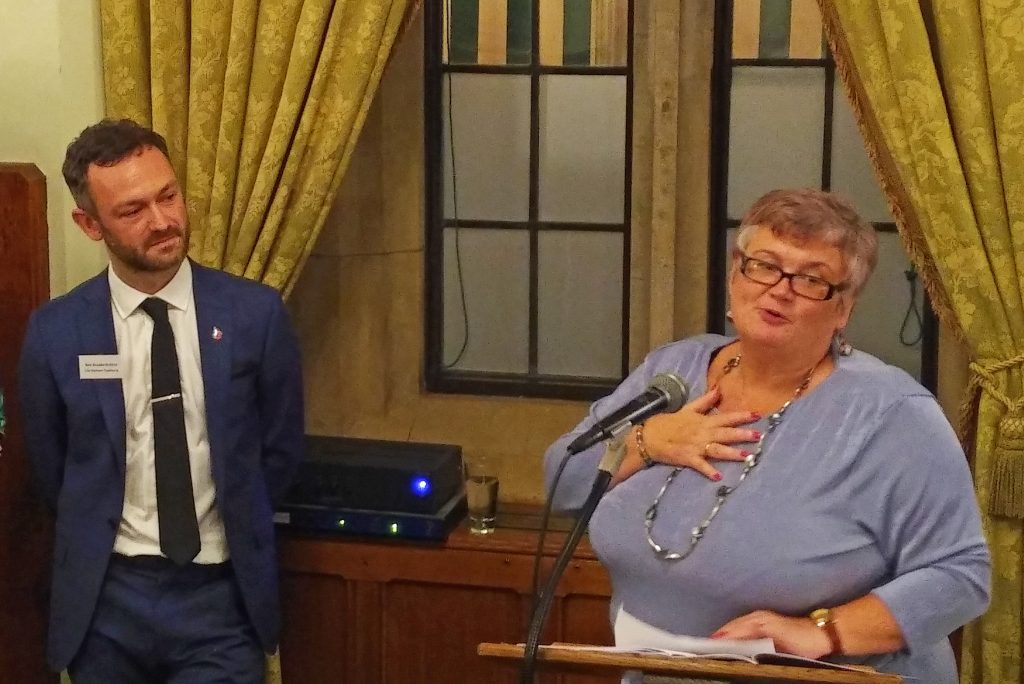
Conversely, if I passed away, Mrs Adams would suddenly find herself dealing with school staff she rarely sees. She’d be booking dental and doctor’s appointments for the kids, things I can’t recall her ever having to do because as their main carer, I do this stuff.
It would be exceedingly tough and based on what’s written in the report, support would be minimal. We’ve written wills, but hearing Brooks-Dutton and Harris talk about their experiences made me realise there’s so much more to bereavement.
Following the Grenfell Tower fire, Prime Minister Theresa May acknowledged that bereaved families do not always get the support they require. By publishing this report, the Life Matters Task Force hopes to build support for its aims and bring about change that will help bereaved families.
As Brooks-Dutton himself says: “It’s time for family bereavement policy to move beyond just benefits.”
I guess it’s a case of seeing if MPs take the report seriously. I’ll certainly be watching closely as I learned a lot at the report’s launch. Death and bereavement are subjects nobody likes to talk about but if doesn’t get discussed and change doesn’t happen, families, bereaved partners and children will continue to suffer.
*The Life Matters Task Force is made up of: Child Bereavement UK, Childhood Bereavement Network, Grief Encounter, Cruse Bereavement Care, Widowed & Young, Winston’s Wish and supported by comparethemarket.com.


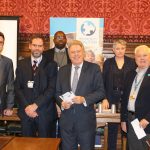

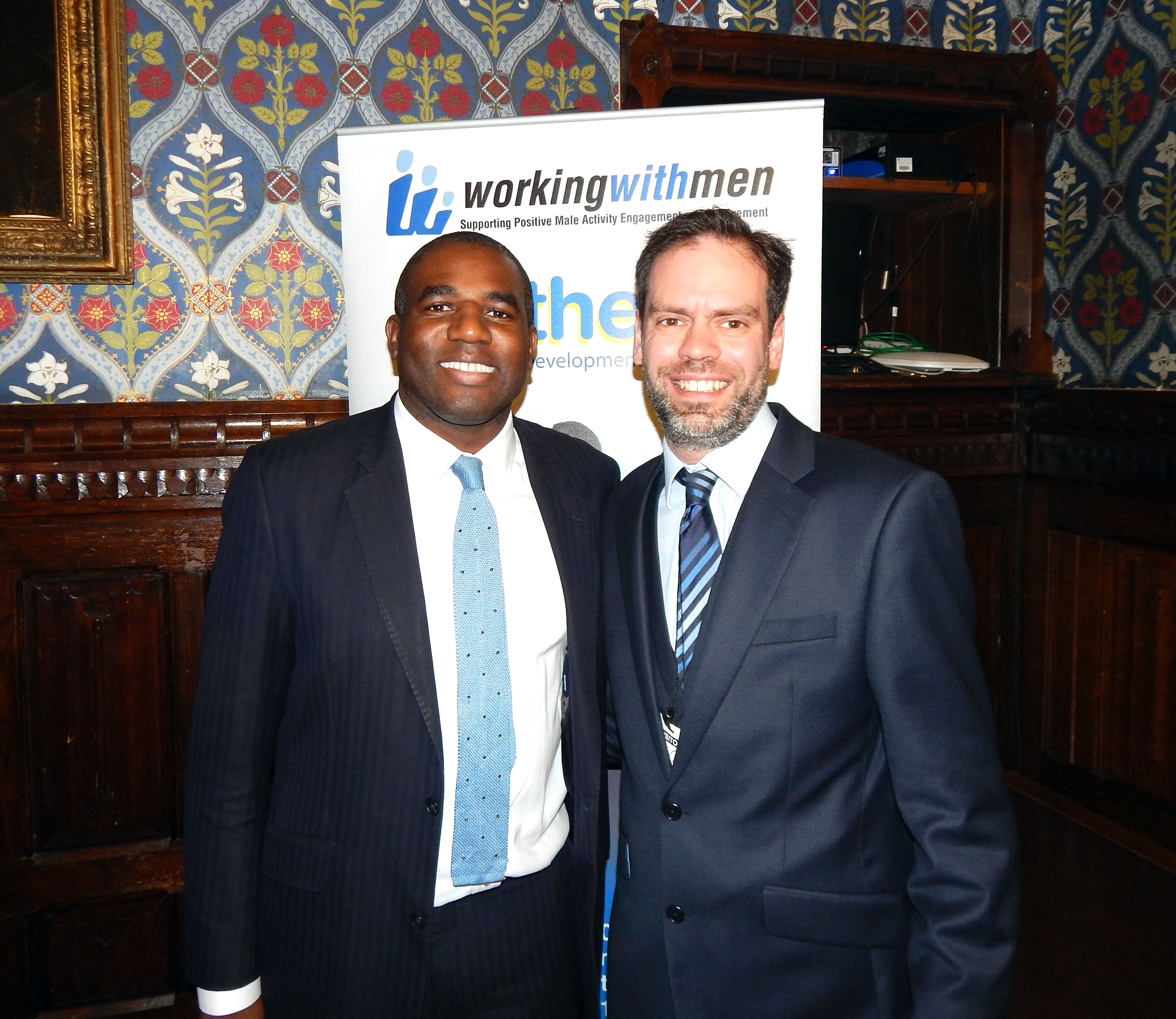



13 thoughts on “Bereaved families: Their lives matter”
A really interesting and thought provoking read. To be honest I’d not given it much thought before and just assumed that because it happens every day (without wanting to sound morbid) support would be available and at least adequate. Will definitely look into this more – thanks.
#thatfridaylinky
Fascinating isn’t it? You simply imagine the support is adequate but no, it’s not in place and people, including children, are suffering as a result.
I’m genuinely shocked that data isn’t collected on widowed parents. I’d have thought children growing up having lost a parent, would have been recorded. That’s genuinely surprised me, yet as you say they collect data on divorced parents. As someone who lost my mum when I was young, my dad was very lucky that we had plans in place, mainly because mum had been ill a while (cancer) so we had time to prepare for it, but for those who find themselves in a position such as Ben’s, where life can change in an instant and without warning, so much more needs to be done. A great post John, thanks for sharing. Thanks for linking up to #ThatFridayLinky
Delighted to link up and raise awareness of this blog post and the issues raised. Thanks also for sharing your story. That must have been tough on the whole family, even with plans in place. I was stood listening to Ben – and other stories – wondering what on earth I would do.
I got nothing too young at 44 for Windows benefits no children WHAT DO I DO
It’s a good question. this particular report was looking at those with dependents. In truth, I don’t know enough about bereavement for those without dependents to be able to help. I would, however, point you in the direction of some of the charities mentioned at the bottom of my blog post.
My Mum died aged 40 in 1982, my 50-year-old Dad was left with a 13, 10 and 4 year old and gave up his job of 38 years to care for us. The loss was never mentioned to us children by any other adult. There was zero support for him (GP just gave him Valium, which he never took). My Dad was a hero. Thirty five years later I wanted to believe things were now better for families suffering such a devastating loss, the ramifications of losing a parent lasts a lifetime. Why are things not better?
That’s a very personal story. Thank you for sharing. It’s shocking that things haven’t improved. In fact the issue of bereavement being swept under the carpet and never mentioned was raised at the report’s launch. Ben Brooks_Dutton was suggesting this was the wrong approach. What a mighty fine father you had. It must have been a shock to go form working dad to stay at home dad in such circumstances. And yes, why haven’t things changed?
It has really shocked me that no data is collected, thankfully it’s being finally addressed really interesting post Thank you for linking to #Thatfridaylinky please come back next week
Came as quite a surprise to me. Without that data, who do you know who to help? It’s quite ridiculous.
I am doing some work in this area, and am dumbfounded at how little we prep for this part of life, and understand what is inevitable. What a death-denying culture we live in! Thank you. #ThatFridayLinky xoxo
Death denying, yet also denying proper support to families when they need it the most. It is genuinely shocking how little help families receive.
Thanks for this John, I found it a really interesting read and a lot of the content really resonated with me.
I live in Australia (though am originally from the UK) my Australian wife, Amy, died 3 years ago from advanced breast cancer. I’ve got two kids who were 5 and 7 at the time (now 8 and 10).
Australia has even poorer support than the UK for widowers. I suspect that nobody knows the number of children who are living with only parents here either.
When Amy was alive I received a (small) carers allowance as well as a few other benefits such as a disabled car badge. When she died I lost these. My work became (in many ways) harder, but I lost what little government support I had been receiving.
Medicare in Australia is worse than the National Health Service in the UK (I have to pay $50 for each doctor’s appointment for my children) and dental treatment is ridiculously expensive. Because I work full-time I get no concessions.
We’re just about to have our (long) summer/school holidays (7 weeks) and it’s an absolute nightmare as I have to juggle work with putting the kids in holiday programmes many of which are pretty expensive. Immediately in the aftermath of Amy’s death people ‘rallied around’ and offered help, but three years on almost all of these people are gone (not sure if they think I should have ‘got over’ it by now?)
There’s no funded support for the children and as your article points out no training for teachers. I’m lucky that our school has a counsellor, but even she has remarked that she’s more used to talking with children who are being bullied or are from divorced families and actually has barely any experience of supporting children who have had a parent die.
I was lucky(?) to meet our Health minister a year or so ago (on an unrelated matter) but dropped some of the issues your article raises, but of course it fell on deaf ears. Definitely an issue that needs to be addressed.